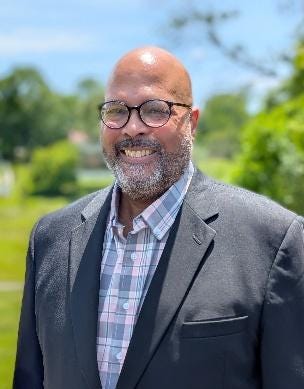I want to begin by thanking the Bridge of Lament Collective for inviting me to be a part of this essential and profound initiative. I have long been an advocate of letting history speak for itself. I believe that the whole truth of America’s story must be told, not to stir outrage, but to spur us to doing and being better–especially toward those who still feel excluded from the supposedly inclusive American ideal that “all men are created equal, that they are endowed by their Creator with certain unalienable rights." The Bridge of Lament is focused specifically on the Lynchburg area, where I’ve lived for fourteen years, and this project has contributed immeasurably to my knowledge of Black history in the place I call home.
A bridge is an appropriate metaphor for the days between June 19th—“Juneteenth,” the commemoration of the day, June 19, 1865, when Union troops delivered the news to enslaved Black people in Galveston, Texas that they were free—and July 4th, when we celebrate the 249th anniversary of the signing of the Declaration of Independence, which has inspired global movements for human rights and self-determination throughout history, and signifies the birth of the United States of America. Although Juneteenth proclaimed the freedom of Black people, signifying their inclusion in the Declaration's promise, the journey towards fully realizing the American creed for all people remains ongoing.
The theme for this year’s articles is education, particularly the Lynchburg region's educators and institutions, and it couldn’t come at a more appropriate and critical time. We can only learn from our history if we present it in its entirety and without fear, and there are far too many people in positions of power and influence who fear a full accounting of American history in our schools, libraries, museums, media, the arts, and the public square. I will leave it to others to discern the root of their fears, at least for now. Suffice it to say that “whitewashing” American history will draw out our journey across the bridge and further delay the reconciliation I believe we all long for.
However, that discussion is for the days ahead. Juneteenth is a celebration, and while it is the most recently declared national holiday, having been recognized in 2021, its history dates to 1866 at church-sponsored celebrations in Texas, where the news of freedom had finally arrived the year before. The Houston Union on June 20, 1871, said that Juneteenth was a celebration of the fact that Black people were the “owners…of their own bodies and souls.” That celebration, marked by parades, cookouts, prayer gatherings, and various community events, spread from Galveston, Texas, to the entire Lone Star state, throughout the South, and, with the Great Migration, traveled north and west with millions of Black people as they left the rural South for better lives elsewhere.
Appropriately, Juneteenth was the first new federal holiday since Martin Luther King, Jr. Day was adopted in 1983 to commemorate the birth of the great civil rights leader who took us further on the journey across that bridge than we had gone before. Although some think that Juneteenth, as a new federal holiday, came out of thin air, let me share with you something I wrote on June 19, 2021:
I confess I'm a little surprised at the commotion over Juneteenth, since it's been around for 155 years. I'm glad it's getting national attention and it's always great to celebrate freedom, isn't it? These moments are so very meaningful to the communities that observe them, and there is room in God's kingdom for every nation, tribe, and tongue to commemorate times of jubilation such as this.
The apostle Paul tells Christians in Romans 12:15 to “Rejoice with those who rejoice; mourn with those who mourn,” and in 1 Corinthians 12:26, he speaks of the body of Christ when he proclaims, “If one part suffers, every part suffers with it; if one part is honored, every part rejoices with it.”
God knows what he's talking about, and I can tell you from personal experience that the fellowship and other-centeredness that comes from identifying with others as God calls for us to do transforms your heart. I consider being able to experience genuine happiness at someone else's success, or sorrow at someone else's loss, a great gift for which I'm forever grateful to God. It makes life better, it truly does.
Happy Juneteenth, y'all!
A dear friend of mine, the Reverend Dean Nelson, who passed away in 2023 at the tender age of 55 after a battle with cancer, wrote an excellent article about Juneteenth, embracing not only its significance to the American quest for liberty and justice for all, but its relevance to Christians:
Juneteenth is also referred to as “Jubilee Day” or “Freedom Day,” and both have their root in the Biblical tradition of forgiving debts, freeing slaves (in the context of Hebrew culture, slaves had typically indentured themselves to pay off debts), and releasing prisoners every 50 years. This demonstration of forgiveness is viewed by Christians as a precursor to the ultimate forgiveness and payment of the debt of sin by Jesus on the cross. Christians in America should find it easy and natural to embrace Juneteenth as an extension of this idea. Like the Christian moral tradition at the heart of our constitutional order, we see in Juneteenth the Christian tradition’s moral vision put on vivid display. Yes, we cannot dispute that Christianity was made a tragic handmaiden to slavery by some, but for others, it was the same religion that taught all human beings were of equal dignity, regardless of skin color.
He concludes by saying, “Juneteenth is not a celebration of American perfection, because nations are never perfect. But it is a right and good celebration of our ongoing commitment to strive toward perfection, by admitting our sins and seeking to overcome them.”
1 Corinthians 12:23 says, “the parts that we think are less honorable we treat with special honor.” While this passage refers to the body of Christ and highlights that even those parts of the body we don’t consider necessary are vital to the whole, I have always thought it perfectly describes how we should uplift those for whom honor has been elusive in the past.
The time for examination and introspection about the distance left to travel in our journey across the bridge is coming. However, today is a day of rejoicing and partaking of every good and perfect gift that God gives us. Founding Father John Adams eloquently described in a letter to his wife, Abigail, the celebrations that would occur nationwide in commemoration of the Declaration of Independence. Likewise, the freedom of Black Americans commemorated on Juneteenth merits the same degree of celebration and recognition:
I am apt to believe that it will be celebrated, by succeeding Generations, as the great anniversary Festival. It ought to be commemorated, as the Day of Deliverance by solemn Acts of Devotion to God Almighty. It ought to be solemnized with Pomp and Parade, with Shews, Games, Sports, Guns, Bells, Bonfires and Illuminations from one End of this Continent to the other from this Time forward forever more.
Whether you attend a community celebration at Miller Park, a gathering at someone’s house, or celebrate at home with the family—Happy Juneteenth, y’all!
Ron Miller is a college administrator, educator, church elder, community activist, veteran, and computer nerd. He lives in Forest, Virginia, with his family. A devoted husband and father of three adult children, he is soon to be a proud grandfather.






